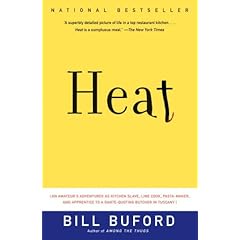
Before you read on, we would like to remind you of our Blogrolling Friendship Giveaway.
Also, submit your review of this book and we will send you a free gift if we publish it on this blog.
Guest review from Amazon.com: Heat is a remarkable work on a number of fronts--and for a number of reasons. First, watching the author, an untrained, inexperienced and middle-aged desk jockey slowly transform into not just a useful line cook--but an extraordinarily knowledgable one is pure pleasure. That he chooses to do so primarily in the notoriously difficult, cramped kitchens of New York's three star Babbo provides further sado-masochistic fun. Buford not only accurately and hilariously describes the painfully acquired techniques of the professional cook (and his own humiations), but chronicles as well the mental changes--the "kitchen awareness" and peculiar world view necessary to the kitchen dweller. By end of book, he's even talking like a line cook.
Secondly, the book is a long overdue portrait of the real Mario Batali and of the real Marco Pierre White--two complicated and brilliant chefs whose coverage in the press--while appropriately fawning--has never described them in their fully debauched, delightful glory. Buford has--for the first time--managed to explain White's peculiar--almost freakish brilliance--while humanizing a man known for terrorizing cooks, customers (and Batali). As for Mario--he is finally revealed for the Falstaffian, larger than life, mercurial, frighteningly intelligent chef/enterpreneur he really is. No small accomplishment. Other cooks, chefs, butchers, artisans and restaurant lifers are described with similar insight.
Thirdly, Heat reveals a dead-on understanding--rare among non-chef writers--of the pleasures of "making" food; the real human cost, the real requirements and the real adrenelin-rush-inducing pleasures of cranking out hundreds of high quality meals. One is left with a truly unique appreciation of not only what is truly good about food--but as importantly, who cooks--and why.











No comments:
Post a Comment